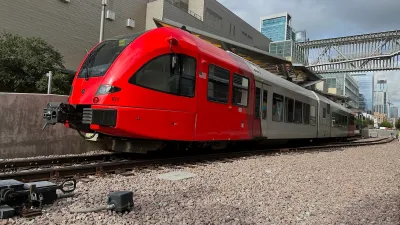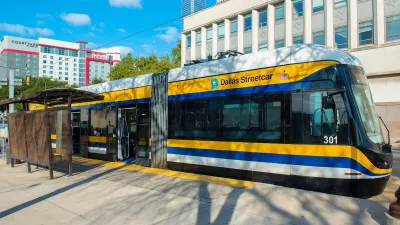After the New Cities Summit last week, and the U.S. Conference of Mayors this week, Dallas has been the location of a lot of recent discussion about the future of cities.
In summing up last week's New Cities Summit, Brandon Formby notes that "even though the country predominantly moves by automobile, many of the conversations focused on public transit and biking." Formby then goes on to provide some insight into discussions on bike lanes, automated cars, and streetcar projects, among other questions of alternative transportation.
In an earlier article, David Flick explains the New Cities Summit's focus on global cities: "Cities, [conference participants] said, must find a way to deal with growing economic inequality and climate change. They must connect with their residents and help them connect with each other. And they must regard culture as more than a luxury."
And in another article, David Mosier describes the reactions of conference attendees to their host city of Dallas:
"Visitors in Dallas for the international New Cities Summit found a strange place that mirrored neither the Texas cliche of cattle and oil nor expectations of a bustling new metropolis."
"Instead, many found an optimistic, spirited city but also one with empty sidewalks, impossibly wide roads, an unhealthy attachment to their cars and not enough vibrancy for a population of more than 1.2 million. Some also saw a place embracing sustainable development and trying to roll back decades of old-fashioned urban planning."
FULL STORY: Transportation trends, challenges emerge at Dallas conferences

Study: Maui’s Plan to Convert Vacation Rentals to Long-Term Housing Could Cause Nearly $1 Billion Economic Loss
The plan would reduce visitor accommodation by 25,% resulting in 1,900 jobs lost.

North Texas Transit Leaders Tout Benefits of TOD for Growing Region
At a summit focused on transit-oriented development, policymakers discussed how North Texas’ expanded light rail system can serve as a tool for economic growth.

Why Should We Subsidize Public Transportation?
Many public transit agencies face financial stress due to rising costs, declining fare revenue, and declining subsidies. Transit advocates must provide a strong business case for increasing public transit funding.

How to Make US Trains Faster
Changes to boarding platforms and a switch to electric trains could improve U.S. passenger rail service without the added cost of high-speed rail.

Columbia’s Revitalized ‘Loop’ Is a Hub for Local Entrepreneurs
A focus on small businesses is helping a commercial corridor in Columbia, Missouri thrive.

Invasive Insect Threatens Minnesota’s Ash Forests
The Emerald Ash Borer is a rapidly spreading invasive pest threatening Minnesota’s ash trees, and homeowners are encouraged to plant diverse replacement species, avoid moving ash firewood, and monitor for signs of infestation.
Urban Design for Planners 1: Software Tools
This six-course series explores essential urban design concepts using open source software and equips planners with the tools they need to participate fully in the urban design process.
Planning for Universal Design
Learn the tools for implementing Universal Design in planning regulations.
City of Santa Clarita
Ascent Environmental
Institute for Housing and Urban Development Studies (IHS)
City of Grandview
Harvard GSD Executive Education
Toledo-Lucas County Plan Commissions
Salt Lake City
NYU Wagner Graduate School of Public Service




























